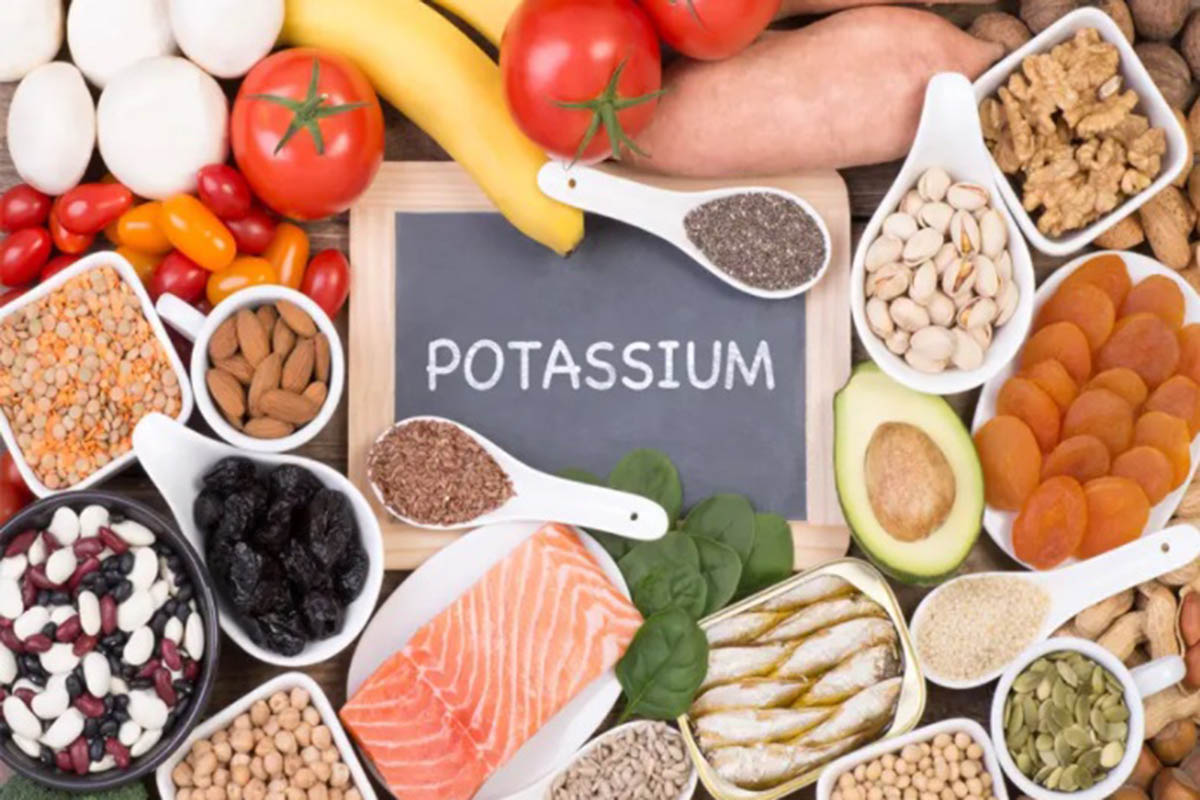Introduction
Potassium is a crucial mineral and electrolyte that plays a fundamental role in maintaining good health. It is often referred to as an essential nutrient due to its wide range of functions within the body. In this comprehensive guide, we will explore the world of potassium, examining its diverse benefits, sources, recommended intake, potential side effects, and its pivotal role in maintaining overall health and well-being.
Understanding Potassium
What is Potassium?
Potassium is an essential mineral and electrolyte that the body needs for various physiological processes. It is a positively charged ion (cation) and is critical for maintaining proper cell function, nerve transmission, muscle contraction, and fluid balance.
Roles of Potassium
Potassium has several vital roles in the body, including:
- Electrolyte Balance: Potassium is one of the main electrolytes, along with sodium and chloride, responsible for maintaining fluid balance and regulating the electrical activity of cells.
- Muscle Function: It is essential for muscle contraction, including the heart muscle, which helps maintain a regular heartbeat.
- Nerve Function: Potassium is involved in nerve transmission and communication between nerve cells, enabling the body to send and receive signals.
- Blood Pressure Regulation: Adequate potassium intake can help lower blood pressure and reduce the risk of hypertension.
- Acid-Base Balance: It plays a role in maintaining the body’s acid-base balance, which is essential for overall health.
The Benefits of Potassium
Heart Health
Potassium is known for its role in heart health. It helps maintain a regular heartbeat, supports proper muscle function, and assists in regulating blood pressure. A diet rich in potassium can reduce the risk of heart arrhythmias and cardiovascular issues.
Blood Pressure Regulation
Potassium is a critical mineral for blood pressure regulation. It counteracts the effects of sodium, helping the body excrete excess sodium through urine. This process relaxes blood vessels, reducing blood pressure and preventing hypertension.
Muscle Function
Muscles, including skeletal and cardiac muscles, rely on potassium for proper contraction and relaxation. Adequate potassium intake helps prevent muscle weakness, cramps, and spasms.
Nerve Function
Potassium plays a pivotal role in nerve transmission. It ensures that nerve cells can send electrical signals efficiently, allowing the nervous system to function correctly. An adequate supply of potassium is essential for maintaining healthy cognitive function and motor skills.
Acid-Base Balance
Potassium is involved in regulating the body’s acid-base balance. Maintaining an optimal pH level in bodily fluids is essential for overall health, as deviations from this balance can lead to various health issues.
Sources of Potassium
Food Sources
Potassium can be obtained from various dietary sources, with some of the richest sources including:
- Fruits: Bananas, oranges, and cantaloupe are high in potassium.
- Vegetables: Leafy greens like spinach, potatoes, sweet potatoes, and tomatoes are excellent sources.
- Beans and Legumes: Lentils, kidney beans, and black beans are potassium-rich foods.
- Nuts: Almonds and peanuts are good sources of potassium.
- Dairy Products: Milk and yogurt are also potassium-containing foods.
- Fish: Certain fish like salmon and tuna provide potassium.
Dietary Supplements
While potassium supplements are available, they are typically only recommended under the supervision of a healthcare professional. Excessive potassium intake, often due to overuse of supplements, can lead to a condition known as hyperkalemia, which can have serious health consequences. It’s generally advisable to obtain potassium from a balanced diet rather than supplements, except in specific medical situations where supplementation is required.
Recommended Intake of Potassium
Dietary Reference Intake (DRI)
The recommended intake of potassium varies depending on age, sex, and individual health status. The Dietary Reference Intake (DRI) for potassium is typically expressed in milligrams (mg) per day. Here are some general guidelines:
- Adults (19 years and older): The recommended intake for most adults is around 2,500 to 3,400 mg of potassium per day.
- Children (varies by age): The DRI for children ranges from 400 mg per day for infants to 2,000 mg per day for teenagers.
- Pregnant and Breastfeeding Women: Pregnant and breastfeeding women may require slightly higher potassium intake to support fetal development and milk production.
Individual Needs
Individual potassium requirements can vary significantly, influenced by factors such as age, sex, activity level, dietary habits, and health conditions. People with specific health conditions like kidney disease may require adjustments to their potassium intake, as their kidneys may have difficulty regulating potassium levels. It is advisable to consult a healthcare professional or a registered dietitian for personalized potassium recommendations, particularly if you have specific dietary restrictions or medical conditions.
Potential Side Effects and Considerations
While potassium is essential for health, excessive intake can lead to hyperkalemia, a condition
characterized by elevated levels of potassium in the blood, which can be harmful. It’s essential to consider the following:
Hyperkalemia
Hyperkalemia can occur when potassium levels in the blood become too high. Symptoms may include muscle weakness, irregular heartbeat, and, in severe cases, cardiac arrest. It is most commonly associated with kidney problems, medications that affect potassium balance, or excessive potassium supplementation. It’s important to consult with a healthcare professional for appropriate potassium management if you have any health conditions or are taking medications that could affect your potassium levels.
Medication Interactions
Certain medications can interact with potassium. Some medications, such as potassium-sparing diuretics and angiotensin-converting enzyme (ACE) inhibitors, can increase potassium levels in the blood, potentially leading to hyperkalemia. It’s essential to inform your healthcare provider about all medications you are taking to ensure they are aware of potential interactions.
Dietary Considerations
While obtaining potassium from natural food sources is generally safe, it’s essential to be mindful of dietary choices. People with specific dietary restrictions, such as a high-potassium or low-potassium diet, should follow their healthcare provider’s recommendations to manage their potassium intake effectively.
Incorporating Potassium Into Your Diet
Food Choices
Incorporating potassium-rich foods into your diet is essential for maintaining optimal potassium levels. A well-balanced diet that includes a variety of fruits, vegetables, beans, legumes, and dairy products can help you meet your potassium needs naturally. Here are some tips for increasing potassium intake:
- Consume Fruits: Incorporate potassium-rich fruits like bananas, oranges, and cantaloupe into your daily diet as snacks or as part of your meals.
- Eat Vegetables: Include leafy greens, potatoes, sweet potatoes, and tomatoes in your meals. Vegetables like spinach and kale are not only rich in potassium but also provide various other essential nutrients.
- Beans and Legumes: Lentils, kidney beans, and black beans are excellent sources of potassium and can be added to soups, stews, and salads.
- Nuts: Almonds and peanuts make for healthy snacks and can be sprinkled on yogurt or used as a topping for oatmeal.
- Dairy Products: Milk and yogurt can be part of your daily calcium and potassium intake.
Supplements
Potassium supplements are typically only recommended under specific medical conditions and should always be taken under the supervision of a healthcare professional. Self-administered potassium supplementation can lead to hyperkalemia and should be avoided unless prescribed by a doctor.
Conclusion
In conclusion, potassium is an essential mineral and electrolyte that plays a pivotal role in maintaining good health. It contributes to heart health by regulating blood pressure and ensuring a regular heartbeat. Additionally, potassium supports proper muscle function, nerve transmission, and helps maintain the body’s acid-base balance.
Meeting your potassium needs through a well-balanced diet is the most effective and safe approach. A diet rich in potassium from various food sources like fruits, vegetables, beans, legumes, and dairy products can help you maintain optimal potassium levels and support your overall health.
- Ultimate THCA Products Comprehensive Review By Exhale Well - June 25, 2024
- Can You Travel With CBD A Comprehensive Guide - October 19, 2023
- The Comprehensive Guide to the Benefits of Reishi Functional Mushrooms - October 19, 2023

